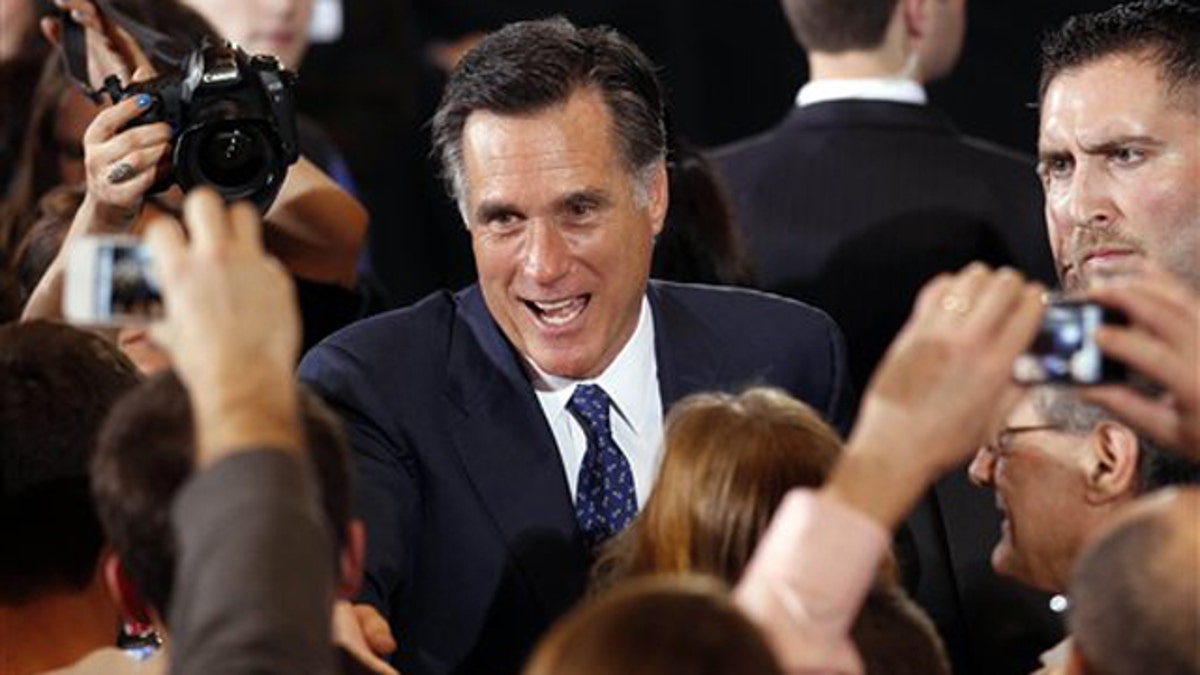
Feb. 28, 2012: Mitt Romney greets supporters at his election watch party after winning the Michigan primary in Novi, Mich. (AP)
Mitt Romney, at least before a pair of primary victories cheered his spirits, seemed bent out of shape over Rick Santorum's overt effort in Michigan to attract Democrats. But Michigan won't be the last place Romney faces the prospect of questionably motivated crossover votes.
Seven of the 10 states hosting primaries and caucuses next Tuesday have what are known as "open" elections. Just like in Michigan, Democrats and independents as well as Republicans will be welcome to vote.
Facing that reality, the Romney campaign already is working to counter an expected push by Santorum to lure those votes. The Romney campaign was holding a conference call Wednesday afternoon in which high-powered supporters from Super Tuesday states planned to call on Santorum to "stop teaming up with Democrats."
At least in Michigan, Santorum's gambit appeared to pay off. Nine percent of the voters in Tuesday's primary self-identified as Democrats, according to exit polls -- and of them, a whopping 53 percent broke for Santorum. Romney, by contrast, pocketed just 18 percent of those voters, roughly the same proportion that backed Ron Paul.
It wasn't enough to put Santorum over the top, but in another contest that turnout could play a deciding role.
The seven states holding open contests are Georgia, Idaho, Massachusetts, North Dakota, Tennessee, Vermont and Virginia. The latter is a unique case, as only Paul and Romney are on the ballot.
Going into the contests, Romney has regained his footing with back-to-back wins in Michigan and Arizona Tuesday night.
But his competitors all have big plans for Super Tuesday and beyond, and are determined to provide pundits with fresh evidence next week that voters still harbor second thoughts about a Romney nomination.
"This is a critical seven days for Romney," said Larry Sabato, director of the University of Virginia Center for Politics, predicting Romney's lead will continue to wobble in the weeks ahead. Sabato described Ohio as a critical state for Romney, or any candidate, on Tuesday. Perhaps making things a bit simpler, Ohio does not hold an open primary.
On Wednesday, Santorum said he was "glad that Democrats showed up in the polls." He explained that "Reagan Democrats" agree with conservatives -- including him -- on numerous issues, including social and religious topics and the need for a resurgence in manufacturing jobs.
But as recently as January, Santorum lamented the other party's role in a primary.
"We want the activists of the party, the people who make up the backbone of the Republican Party to have a say in who our nominee is as opposed to a bunch of people who don't even identify themselves as Republicans picking our nominee. I don't like that. I believe that states should only allow Republicans to vote in Republican primaries," he told reporters in a Jan. 29 conference call.
In a press conference at his Michigan headquarters on Tuesday, Romney warned about crossover voting, saying Democrats could choose "who they think is the easiest person to run against" -- in other words, the candidate President Obama could most easily beat in November.
"I think Republicans have to recognize there's a real effort to kidnap our primary process," Romney said.
But Romney has found himself defending crossover participation of his own -- his vote in the 1992 Democratic presidential primary for Paul Tsongas. Romney said Tuesday that the Tsongas vote was different, and grounded in a genuine desire to stymie Bill Clinton.
"In my case, I was certainly voting against the Democrat who I thought ... would be the worst leader of our nation. In this case, as I recall, it was Bill Clinton," Romney said. "I wanted someone other than Bill Clinton. ... I voted against Ted Kennedy, Tip O'Neill, and Bill Clinton. It seemed like a good group to be against."
Liberal filmmaker and Michigan native Michael Moore acknowledged in an interview ahead of Tuesday's primary that his Democratic friends were voting for Santorum. It was, he said, part of "Operation Hilarity," an effort by Moveon.org to disrupt the GOP nomination.
Debbie Wasserman Schultz, chairwoman of the Democratic Party, on Wednesday denied any orchestrated movement to get Democrats to vote Santorum.
"We weren't involved in any organized effort to get Democrats to do that," she said. Rather, she said Democrats use contests like Michigan as an "organizing tool," opening offices and reaching out to supporters in the state. If Democrats want to then go ahead and vote in the GOP primary, she said, that "always has been their choice."
Whether or not the 53 percent of the Democratic vote was a reflection of Democrats' desire to pick a weaker candidate to run against Obama, Santorum was the clear beneficiary of their participation.
Without mentioning the open primary process, Santorum said Wednesday that he's feeling very good about his chances on Super Tuesday.
"We're going to compete, and we're going to do exceptionally well on Super Tuesday," Santorum told Fox News. "We're going to show that we are the alternative -- if you want a conservative that's going to go up again Barack Obama."




